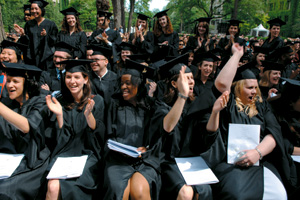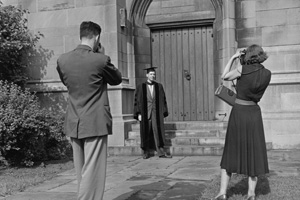The big 5-0-0
The University celebrates a milestone convocation—and plans for pomp and circumstance on a grander scale.
By Amy Braverman Puma

Graduates cheer at the June 2007 convocation. (Photograph by Dan Dry)
The long procession was cut short because of rain. Instead of passing through Hull Gate and the quadrangles this October Friday morning, the bagpipers, flag bearers, and marshals marched from nearby Ida Noyes Hall into Rockefeller Memorial Chapel. Behind them promenaded University faculty, student representatives, the Alumni Board of Governors, administrators, trustees, honorary-degree recipients, the faculty speaker, the provost, presidents emeriti, and the University president. Viewers in the pews stood as the music shifted from bagpipes to carillon to organ to silence. Then University Marshal Catherine C. Baumann called to order Chicago’s 500th convocation.

A graduate poses for photographs, undated. (Courtesy Special Collections Research Center)
Five hundred times now the University community has gathered to confer degrees (none were awarded at the first two ceremonies, in January and April 1893). The count includes four graduation ceremonies each year, plus special convocations to mark momentous anniversaries and inaugurate presidents, both occasions when the University grants honorary doctorates to keep the focus on the life of the mind. The tradition continued at this special ceremony: faculty members presented four honorary-degree candidates, scholars outside Chicago.
The emphasis on inquiry carried through the ceremony. In his faculty address Martin E. Marty, PhD’56, the Divinity School’s Fairfax M. Cone distinguished service professor emeritus of the history of modern Christianity, celebrated Chicago’s approach to finding and solving problems. Even “philosophers and theologians” make discoveries, he said, “so long as they deal, for example, with the mysteries of the human subjects in the disciplines and the professions.”
President Robert J. Zimmer, meanwhile, noted that William Rainey Harper set out not only to create a research university modeled on great German institutions but also to “revolutionize the idea of higher education in the United States.” And Chicago has, indeed, “ultimately exerted a major influence on other—and older—higher-education institutions in this country.”
As the University looks to another 500 convocations, administrators are changing how Chicago celebrates its spring graduations. Plans for June 2010 call for a single ceremony on the main quad rather than separate sessions in Harper quad. The shift returns the University to Harper’s vision of convocation as a time to bring the entire community together. Still, the focus, as it has been for 500 ceremonies, remains on scholarship, that quintessentially Chicago enterprise.—A.B.P.
WRITE THE EDITOR
DISCUSS THIS ARTICLE
E-MAIL THIS ARTICLE
SHARE THIS ARTICLE
WEB EXTRA
RELATED LINKS
University’s 500th convocation Web site
RELATED READING
- Martin Marty’s faculty address:
"On Laying Siege to Problems" (pdf) - President Zimmer’s address:
"500th Convocation" (pdf) - Editor's Notes:
"Graduated Circumstances"
